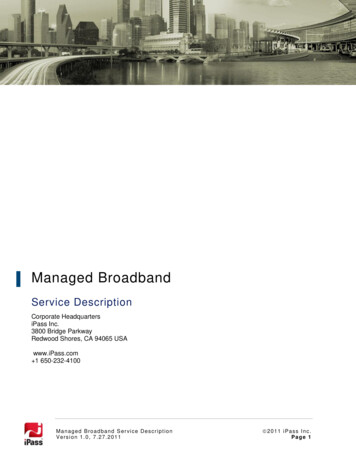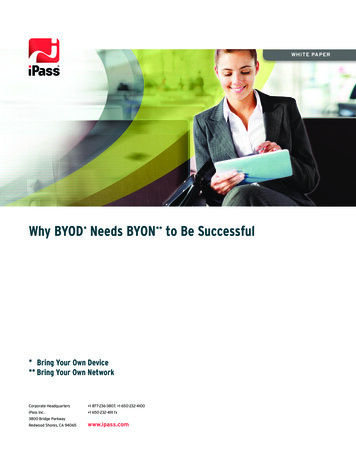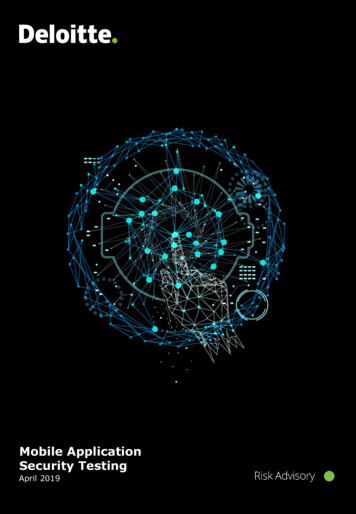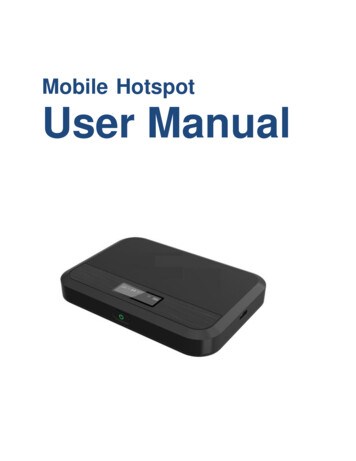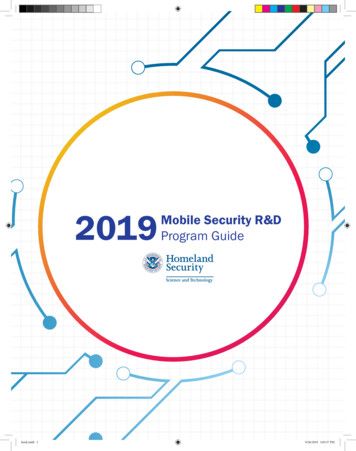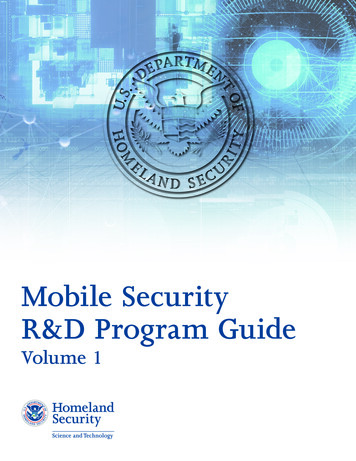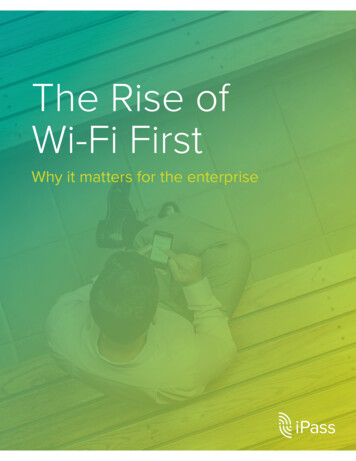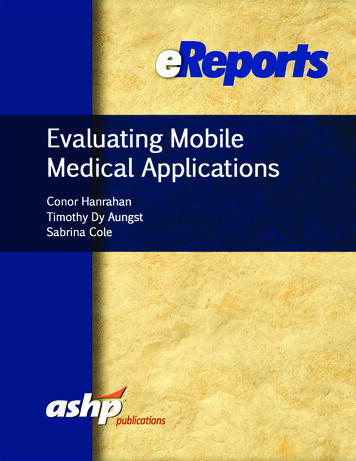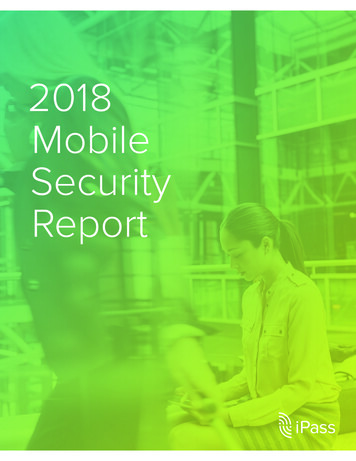
Transcription
2018MobileSecurityReport
CONTENTSIntroduction3Businesses suspect their mobile workers are being hacked4Cafés, airports and hotels: a hotspot for Wi-Fi relatedsecurity incidents5BYOD: Bring Your Own Danger?6Mobile security challenges remain a huge concern7Banning public Wi-Fi8Mobile VPN: A missed opportunity?9Conclusion10About iPass102018 Mobile Security Report2
Mobile working is increasingly becoming the norm for many enterprises, withindustry analyst Strategy Analytics predicting that there will be 1.75 billion mobileworkers by 2020. At the same time, mobile security threats are on the rise: accordingto the McAfee Mobile Threat Report Q1 2018, 16 million users were hit with mobilemalware in the third quarter of 2017.The use of free public Wi-Fi continues to pose the biggest mobile security threat forenterprises. Yet with connectivity being vital to productivity, today’s ‘Wi-Fi first’ mobileworker often turns to free public Wi-Fi as their first port of call. With millions of Wi-Fihotspots globally, all with varying security credentials, how can enterprises ensure theconnections that their mobile workers use are secure? At a time when data protectionis paramount, enterprises need to strike a balance between keeping their data andsystems secure, while not hampering the productivity of their mobile workforce.Surveying 500 CIOs and senior IT decision makers from the U.S., U.K., Germany andFrance, the iPass Mobile Security Report 2018 examines how organizations viewtoday’s mobile security threats and employees’ use of free public Wi-Fi.The report’s findings include the following: The majority of CIOs suspect their mobile workers have been hacked or caused amobile security issue in the last 12 months CIOs have seen the most Wi-Fi related security incidents happen at cafés, airportsand hotels CIOs believe mobile security risks have increased due to the rise of BYOD Banning employee use of free Wi-Fi hotspots is still the preferred security measurefor most organizations Employee VPN usage is on the rise, but the majority of CIOs are still not confidenttheir mobile workers are using them all the time2018 Mobile Security Report3
Businesses suspect their mobile workers are being hackedToday’s professional rarely stays in one fixed location;they could be at an airport departure lounge or hotel oneday and working at a café between meetings the next.Wherever they are, mobile workers can likely find free oron-demand Wi-Fi to access the corporate systems and datathey need in order to do their job.For all the benefits this brings, it has also significantlyincreased business risk. Indeed, more than half (57%) ofrespondents said they suspect that one or more of theirmobile workers has been hacked, or caused a mobile security issue, in the last 12 months. Respondents in Germany(71%) were particularly concerned that they had beenexposed to mobile security issues in the last 12 months.FIG 1:Source: Vanson BourneDo you suspect that one or more of your mobileworkers has been hacked or caused a mobilesecurity issue in the last 12 50%61%60%71%70%10%0%TotalU.K.FranceGermanyU.S.2018 Mobile Security Report4
Cafés, airports and hotels: a hotspot for Wi-Fi relatedsecurity incidentsOverall, 81% of respondents said they had seen Wi-Firelated security incidents in the last 12 months, with cafés,airports and hotels being cited as the most vulnerable locations. This is perhaps not surprising, as all these locationssee a high turnover of visitors each year and the level ofsecurity at each hotspot varies.Percent of organizationsthat have seen Wi-Firelated security issuesin the last 12 months.81%Of those respondents that had seen a Wi-Fi related securityissue in the last 12 months, nearly two-thirds (62%) hadseen them occur in cafés and coffee shops. The problemis particularly acute in the U.K., where 81% had seen cafésand coffee shops contribute to Wi-Fi related securityissues. There were also significant geographic differenceswhen it came to Wi-Fi related security issues at airports:more than two thirds (68%) of U.S. respondents said theyhad seen incidents at airports, in contrast to only 39% inthe U.K.FIG 2:Source: Vanson BourneWhere have you seen the most Wi-Fi relatedsecurity incidents occur in the last 12 months?ACafés and coffee shopsDTrain stationsBAirportsEExhibition K.FranceGermanyU.S.2018 Mobile Security Report5
BYOD: Bring Your Own Danger?The concept of bring your own device (BYOD) is nowcommonplace: despite the large number of people workingremotely, Gartner says fewer than a quarter (23%) havebeen supplied with a mobile device by their employer.This leaves enterprises open to security risks, as they donot have control over the security settings or capabilitiesof devices that are being used.Enterprises are in a Catch-22 situation when it comesBYOD. Many enterprises realize it can improve not onlyemployee productivity, but also wider job satisfaction.However, there is a trade-off with potential security risks.Survey respondents recognize that the risk has beenincreased by BYOD, with 94% reporting that they thinkBYOD has increased mobile security risks.FIG %Yes, somewhat42%52%50%B52%55%Yes, a lot53%60%60%A49%Do you think BYOD has increased mobilesecurity risks?48%Source: Vanson Bourne0%TotalU.K.FranceGermanyU.S.2018 Mobile Security Report6
Mobile security challenges remain a huge concernBased on the earlier statistics, it’s not surprising that enterprises remain concerned about the security risk posed bythe growing number of mobile workers. Overall, 92% oforganizations said they were very concerned or somewhatconcerned their growing mobile workforce presents anincreasing number of mobile security challenges.There’s a perfect storm brewing: a rapidly growing mobileworkforce, the explosion of free public Wi-Fi coupled withever more sophisticated hackers.FIG 4:Source: Vanson BourneWith a growing mobile workforce, are youconcerned this presents an increasingnumber of mobile security challenges?AVery concernedBSomewhat concernedCNot very concernedDNot at all 7%70%U.S.2018 Mobile Security Report7
Banning public Wi-FiWhen organizations take action to stop mobile security threats in their tracks, they’re likely to take a directapproach—stopping the problem at the source by placinga blanket ban on the use of free Wi-Fi hotspots.Bans have been introduced by 67% of respondents, with27% banning the use of free Wi-Fi hotspots at all times and40% banning their use sometimes. A further 16% plan tointroduce a ban on public Wi-Fi hotspots in the future. U.K.enterprises seem to be taking the most liberal approach,with 42% of organizations stating they have no plans toban employees from using free Wi-Fi hotspots.An outright ban might sound like the best course of actionto take, but is likely to have a negative impact on the widerbusiness, making it more difficult for remote workers toremain connected and productive at all times. As mostelectronic devices only have a Wi-Fi connection, banningmobile workers from accessing free-Wi-Fi connectionsat coffee shops, hotels and airports is akin to cutting offyour nose to spite your face. So how can organizationsachieve the best of both worlds when it comes to securityand productivity?FIG 5:Source: Vanson BourneBased on increasing security risks, doesyour organization currently ban your mobileworkers from using free Wi-Fi hotspots?A Yes, all the timeBYes, sometimesC No, but we plan to in the futureD No, and we do not plan .FranceGermanyU.S.2018 Mobile Security Report8
Mobile VPN: A missed opportunity?Virtual Private Networks (VPNs) can be a great way tosecure remote connections to data and central systems,providing an alternative to a blanket ban on free Wi-Fihotspots with an extra layer of security, which has to bedeployed by the end user each time they wish to connect.they go online. This figure leaps in the U.K. and France,where 62% and 59% of respondents, respectively, said theyweren’t fully confident that their mobile workers are usinga VPN when they go online.There are several barriers preventing mobile workers fromconnecting to VPNs, including the fact that mobile workersmight not want personal data to run over the corporatenetwork and that connecting to VPNs can take extra time.The challenge lies in building employee knowledge of theimportance of using VPNs every time they go online, andhow to connect to one in a quick manner.VPN usage is increasing: in 2016, just 26% of enterpriseswere fully confident mobile workers were using a VPNevery time they went online, but that figure has jumpedto 46% in 2018. That does however leave more than half(54%) of respondents reporting that they still aren’t fullyconfident that their mobile workers use a VPN every timeFIG 6:Source: Vanson BourneHow confident are you that yourorganization’s mobile workers use aVPN every time they go online?AI am 100% confident that our mobile workers use aVPN every time they go onlineBI am somewhat confident our mobile workers usea VPN every time they go onlineCI am not confident our mobile workers use a VPNevery time they go rmanyU.S.2018 Mobile Security Report9
ConclusionEnterprises are increasingly aware of the fact that the hugegrowth in mobile working presents new security issuesto worry about. IT teams are no longer fully in control, asconnectivity and access to corporate systems now extendsbeyond the four walls of the office.The huge, global growth in free Wi-Fi hotspots continuesapace, so organizations outright banning employees fromusing them is a somewhat short-sighted approach. Thefact is, mobile workers will always seek out connectivity,irrespective of the security risks involved, if it enablesthem to get work done. In today’s connected and increasingly ‘Wi-Fi’ first world, enterprises need a modern mobileworking strategy that empowers employees, as opposed tostopping them in their tracks.Rather than imposing a blanket ban on the use of freepublic Wi-Fi, they should make all employees aware ofthe benefits of using VPNs to connect securely, and makethe process of connecting to one as simple as possible.This way they can maintain security while also keepingemployees productive, no matter where they are located.About iPassiPass (NASDAQ: IPAS) is a leadingprovider of global mobile connectivity,offering simple, secure, always-on Wi-Fiaccess on any mobile device. Built ona software-as-a-service (SaaS) platform,the iPass cloud-based service keepsits customers connected by providingunlimited Wi-Fi connectivity on unlimited devices. iPass is the world’s largestWi-Fi network, with more than 64 millionhotspots around the globe, at airports,hotels, train stations, convention centers,outdoor venues, inflight, and more. Usingpatented technology, the iPass SmartConnect platform takes the guessworkout of Wi-Fi, automatically connectingcustomers to the best hotspot for theirneeds. Customers simply download theiPass SmartConnect app to experienceunlimited, everywhere, and invisibleWi-Fi.iPass Corporate Headquarters3800 Bridge ParkwayRedwood Shores, CA 94065phone: 1 650-232-4100fax: 1 650-232-4111www.ipass.comiPass is a registered trademark of iPassInc. Wi-Fi is a registered trademark ofthe Wi-Fi Alliance. All other trademarksare owned by their respective owners.2018 Mobile Security Report10
France, the iPass Mobile Security Report 2018 examines how organizations view today's mobile security threats and employees' use of free public Wi-Fi. The report's findings include the following: The majority of CIOs suspect their mobile workers have been hacked or caused a mobile security issue in the last 12 months
